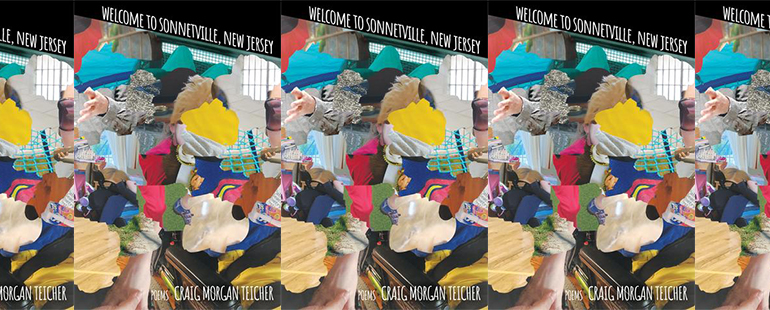The Anxiety of Middle-Age in Welcome to Sonnetville, New Jersey

What if the monotony and anticipation of Thursday lasted ten years? Suddenly: it’s still Thursday, but your body has changed, and what you had expected from your life, wonderfully, is not at all what you remember. Craig Morgan Teicher would have us believe he’s lived only on Thursday while writing his newest collection Welcome to Sonnetville, New Jersey, out this past spring. After years of Thursday that swell with experience, Teicher records the privations of an ever-changing middle-age. In “Ode,” for example, he reflects, “I find myself / recoiling more and more / from more,” then wallows, “No one would blame me. / No one would notice.” Teicher might have us believe something about the close-quartered intimacies readers overhear—that somehow we’re not meant to notice—but these poems belie their making: of course, one notices because the poems demand our attention.
“Didn’t you just turn ten, or forty? / When was your daughter born? / How is it now already?” The inhabitants of Sonnetville, New Jersey wish that time moved irregularly and, in the present, it seems immeasurable. But in Sonnetville, New Jersey, like everywhere else, there is a “before” and “after” for both the monumental and inconsequential moments in our lives: the birth of a child, late-night indigestion, hearing a beloved song on the car radio. Teicher’s collection is spoken outwardly from middle age, beginning with a meditation (if not panicked redress) on how one possibly arrives in the present, if they ever do—how is it now already? He writes in the collection’s first poem, “these were our twenties, when, / post-9/11, we were about to / inherit the world.” “Peers” recalls that, in one’s youth, the present seems more like a moment to be constantly anticipated, though it seems to be not quite the future; now, as the poems digress, a young adult becomes a father, a mother, a mid-career professional, a poet. The poet remembers everything before right now; the poet considers the patterns of his life thus far then imagines what happens if those patterns continue into time that has not yet happened. The poems organize an experience of the present, upon which readers are invited to listen.
This invitation to listen, though, does not occur from an analytical distance—a place from which readers might carefully observe the facts of life-rendered-art. One wills themself into that degree of observation, into criticism. When a poem begins “I am, basically, a good person,” we almost impulsively ask: what does basically include, why does the poem cherish itself with such a rhetorical flourish, what are readers meant to realize? In this introduction to the second of five poems titled “Assurances,” who does basically assure, if an answer most accurate cannot be either/or: the person writing the poem or the person reading the poem? The answer is every party involved—the statement moves outward, and readers eavesdrop from behind a closed door.
Likewise, when a poem approximates a conversation between partners—between anyone, really—discussing habits the other finds intrusive, distracting, reflecting years of the same conversations about the same behavior, one asks: how does this ventriloquizing represent a real, embodied human who is and is not the poet, nor the speaker of the poem, nor you or me reading the poem? “I’ll miss you,” the poem half-heartedly consoles, then continues: “you’ll miss me, saying love was a train that flew / past. Did either of us get on? But stake / out your writing nights—you insist you have to. / I’ll adjust; I always do. But you’ll miss me missing you.”
This final stanza from “Dialogue Between Married Poets,” a poem that loosely follows the schema of a villanelle, condenses what’s being argued into a tautology: both parties, both poets, feel they readily adjust to the other’s habits, they both miss the other, and they both anticipate the other missing the other, echoing the other’s language ad infinitum. If the poem’s dialogue exposes a continued miscommunication between the couple being dramatized, the way the poem is made, its repetition and improvisation on the expected turns of a form of repetition, suggests the need to move away from those patterns. One partner asks, “Didn’t we make / this promise—to enable each other to do what we have to,” and as if to follow that insistent movement through regression, the other responds, “Of course we did, but you see how you skew / my words. I’ll write when I can, but you take / too much from the shared pot. I’ll miss you . . .” The poem pressurizes one’s sense of emotional restraint—as if the speaker initially understands his repetition as hapless, arbitrary, yet comes to recognize these sentences as obliged forward by the decorum of form, of his marriage. The figures talk forward, the figures talk backward. The efficacy of the conversation itself eventually seems unimportant (of course, I hope one doesn’t bicker through poems—there are more effective ways of communicating with a loved one). Instead, the patterns of the argument, how the sentences are arranged on the page, communicate something more intimate than the obvious miscommunication: the anxiety of being understood, and the way that desperation pulses underneath what is explicitly spoken.
Here, one might pause to connect Teicher’s poems to their one-of-many mid-century originary fountains: Robert Lowell’s cycle of sonnets, written obsessively over ten years and abandoned for the last collection published before his death. Perhaps one notices how “Dialogue Between Married Poets” briefly echoes Lowell’s ‘To Speak of the Woe That Is in Marriage” (itself a line spoken by Chaucer’s Wife of Bath). Infamous for his terse poems in dialogue, or those which maladapt the words of those who loved him (mostly Elizabeth Hardwick), Lowell is a model for Teicher’s sense of formalism, or what the arrangement of a poem might accomplish in the time it takes to slow-down and read. When, in the prose poem “Drunkenness,” Teicher remembers “the sin you’d committed fell so far into the past, an apology wouldn’t matter,” he’s replacing Lowell’s almost-compulsive reattribution with a five-eyed stare (one for each direction)—a formal ambivalence. Even though Welcome to Sonnetville, New Jersey is populated by sonnets, one also finds there a long sequence of prose poems, poems made from aphorisms, language overheard and redistributed, imitations of grade-school math quizzes. “Word problem: I am now as old as my parents were when they were my parents. My children are as old as I was. How many apples does Jenny have left?”
The amount of fruit Jenny owns, of course, doesn’t really matter. A question framed as an algebra problem, as if a poem could articulate its pathos as an equation to be deduced, lends itself to impossibility. Every poem, it seems, tries to make legible something impossible. How we arrive at that legibility is the experience of reading that poem, over and again, as its formal design communicates something that has not been, cannot be, or will never be prescribed through narrative. And when we’re invited to participate in his poems—Teicher’s imperative, “The end is near. / [Add great last line here.]”—we contextualize what, exactly, it means to overhear such private moments. How the experience of aging might be curated in the present, or the act of patterning the past, becomes an increasingly unthinkable task the more one stares at a page: what does this language obfuscate, what does it clarify? Teicher ironically admits to himself, “I find / my energies once again, diverted into a secondary, or tertiary, / channel, another eddying place”—as if the act of writing a poem were somehow more than an eddying place where one returns to the same questions, obsessions, the same loves, memory. These poems gently nudge both their maker and their readers into remembering just how valuable, if not entirely sacred, that eddying place becomes when time continues: “Craig, this is the only life you’ll get. / It must be you who cares.”



